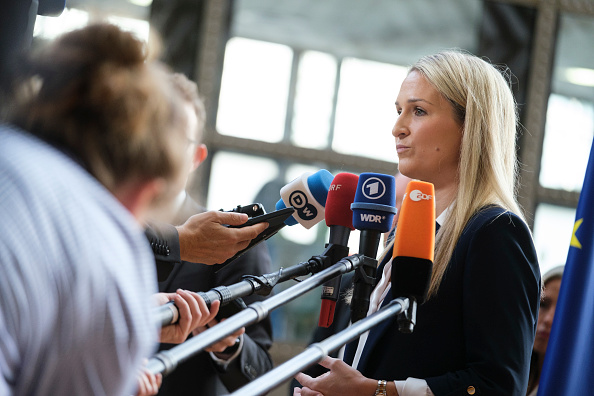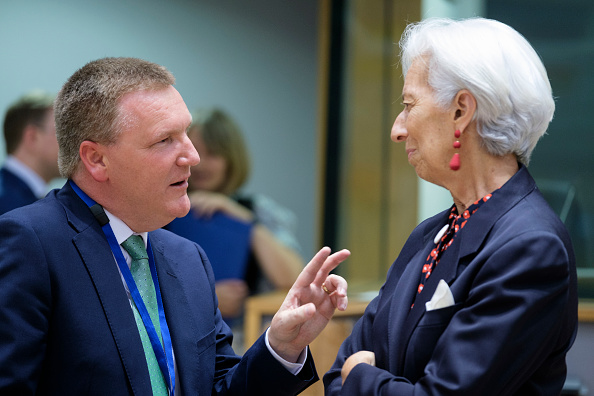Ireland’s Green Party has suffered a crushing defeat in the country’s general election, with the government coalition partner losing 12 of its 13 seats.
In the November 29 ballot, 30 per cent of voters identified cost of living increases as their chief concern in exit polls. Green policies drew less appeal at the ballot box.
In the previous government, the Green Party had three ministers. Of them, Roderic O’Gorman has been left as head of a parliamentary party of just one member after being elected following the 13th recount of votes cast in his Dublin West constituency.
“You get political capital and you spend it. And we spent it,” O’Gorman told reporters afterwards. “There’s been a cost, that’s politics. We don’t run to just get the seat and hold the seat and not do anything,” he added.
The Green Party lost support of its base for joining the Fine Gael-Fianna Fáil coalition in the previous government, with its 13 members giving the government its total of 96 seats in the 160-seat Dáil following the February 2020 general election.
During their time in government, voters also blamed Green Party ministers for unpopular initiatives including a carbon tax and a European Union directive on nitrates, despite both having been primarily the work of Fianna Fáil ministers.
O’Gorman said he had “no regrets” about having entered the three-party governing coalition. Regarding his former partners, he said: “I don’t think they did us any favours,” noting Green Party candidates received “very few transfers” from coalition parties’ Fianna Fáil or Fine Gail candidates.
Ireland has a single transferable vote system, meaning “surplus” votes for candidates who garner the minimum number required to be elected are reallocated to voters’ next preferred candidate, along with those for candidates who do not receive enough votes and are eliminated.
O’Gorman’s party also faced criticism from other left-wing parties that argued it was too committed to its partners and market solutions.
People Before Profit, which received 2.8 per cent of votes and describes itself as “Ireland’s largest eco-Socialist organisation”, had said on X on November 16: “Green parties in France, Netherlands, Switzerland and Malta have backed free public transport. But the Irish Green Party laugh at the idea. Why?”
O’Gorman, who said he would remain as Green Party leader, added: “If someone had told me … this what was going to happen, I’d do it all again, it’s absolutely worth it.”
The @greenparty_ie is suffering a wipeout. Why?
They put the two big business-as-usual parties back into power, *never* held them to account, and achieved very little (if anything, on balance) for nature/climate to show for it.
What did they expect???https://t.co/7oAHS7WePm
— Eoghan Daltun ? (@IrishRainforest) November 30, 2024
Green Party candidate and now-former arts minister Catherine Martin lost her seat on the ninth count in her Dublin Rathdown constituency in what the Dublin People Group news outlet on X on December 1 called the election’s “Portillo Moment”.
That was in reference to the UK ballot in 1997, when Labour Party candidate Stephen Twigg defeated the sitting MP and Conservative cabinet minister Michael Portillo, indicating the ruling Conservatives would lose the general election.
After the Irish vote, given the collapse of the left-wing Green Party, the leader of the new, right-wing Independent Ireland party said he was open to discussions with Fine Gael and Fianna Fáil about taking the Green Party’s place in a government coalition.
“We are going to talk,” party leader and Cork-South West MP Michael Collins told the Sunday Business Post on December 1. While the party was only formed in November 2023, it received 3.6 per cent of the first-preference vote (ahead of the Green Party’s 3.04 per cent) and was projected on December 1 to win between three and five seats.
Taoiseach (Prime Minister) Simon Harris’ Fine Gael party performed worse than expected when it called the early election on November 8. It and Fianna Fáil had seemed confident of forming Ireland’s next government with a small number of third-party or independent ministers at the time.
Mary Lou McDonald, leader of the opposition Sinn Féin, saw her party shed more than five percentage points from its showing in the 2020 election, receiving 19 per cent of first–preference votes, compared with 24.5 per cent four years earlier.
Fianna Fáil proved the most popular party in first-preference votes, with 21.9 per cent, followed closely by Fine Gael with 20.8 per cent.





